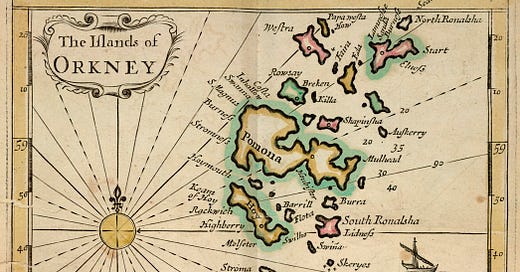The Clan Gunn and the Orkney Islands
The Orkney Islands, a windswept archipelago off the northern coast of Scotland, hold a profound historical connection with the Vikings. This connection is particularly significant for the Clan Gunn, a Scottish clan with deep Norse roots that trace back to the Viking Age, an era that molded much of the cultural and historical landscape of Northern Scotland.
The Viking Influence
The Vikings, known in Old Norse as "Víkingr" (meaning Sea Rover), were not just raiders but also settlers who left a lasting impact on the places they reached. The Orkney Islands became one of their pivotal bases. By the late 8th century, these islands had become a strategic maritime hub for Vikings venturing further into Scotland and beyond.
The Gunns’ Norse Ancestry
The Clan Gunn, bearing a name of Norse origin, is believed to have descended from the Norsemen, specifically from one Gunni, who was said to be a grandson of Sweyn Asleifsson - the ultimate Viking, known for his daring raids. This lineage ties the Gunns not only to the mainland of Scotland but deeply roots them in the Norse governance that dominated the Orkney Islands for centuries.
The Role of the Orkney Islands in Clan Gunn’s History
During the Viking Age, the Orkney Islands were under Norse rule and served as a critical point of control over the northern seas. The Gunns, originating from these Norse settlers, held significant influence in the area, benefiting from their strategic position and maritime prowess that were hallmarks of their Viking forebearers.
The significance of the Orkney Islands to the Clan Gunn is multifold. Not only did these islands serve as a geographical stronghold, but they also stood as a cultural bridge, carrying Norse traditions into the clan's Scottish integration. The islands' place in the clan's history is evident in their continued importance in the sagas and tales that recount the deeds of the Norse in Scotland.
Historical Incidents of the Clan Gunn in Orkney
One notable incident involving the Clan Gunn in the Orkney Islands occurred in the mid-12th century when a feud broke out between the Gunns and another Norse-descended clan over territorial disputes. This feud was characterized by a series of raids and retaliations that underscored the maritime and military capabilities of the Clan Gunn, inherited from their Viking ancestors. The disputes often centered around the control of strategic maritime positions, crucial for controlling the trading and raiding routes across the North Sea.
Another significant historical account details the participation of the Clan Gunn in the Battle of Summerdale, the last Viking-style battle fought in Orkney. The Gunns, alongside other Norse clans, faced Scottish forces in a conflict that was both bloody and decisive. It marked the end of Norse military dominance in the Orkney Islands and paved the way for a more integrated Scottish rule.
The Gunn Clan’s Legacy
The legacy of the Clan Gunn is deeply intertwined with the history of the Orkney Islands. This connection underscores the broader theme of Scottish-Norse heritage, showcasing how the Vikings' influence extended beyond mere conquest to shape the cultural and societal frameworks of their new homes.
For centuries, the Orkney Islands remained under Norse control, and even after being officially annexed to the crown of Scotland, the Norse influence remained palpable. This is reflected in the many Norse names across the islands and the enduring Norse castles that still capture the imagination of visitors.
Preservation of Norse Heritage
Today, the Orkney Islands continue to celebrate their Norse heritage, with the Clan Gunn playing a crucial role in these commemorations. The clan’s historical ties to the islands highlight a fascinating chapter of Scottish history that reflects a unique blend of Norse and Scottish cultures. Museums and cultural festivals in Orkney often feature exhibits and events that trace the Gunn Clan's history, offering insights into their significant role in the Norse saga of Scotland.
Understanding the Clan Gunn’s relationship with the Orkney Islands provides not only insight into the clan's origins but also into the broader narrative of Viking influence in Scotland. It's a tale of integration, adaptation, and enduring legacy that continues to define the cultural landscape of the Orkney Islands and Northern Scotland. This blend of history and legend serves as a bridge connecting the modern inhabitants of Orkney to their storied past, ensuring that the legacy of the Clan Gunn continues to enrich the cultural heritage of Scotland.





